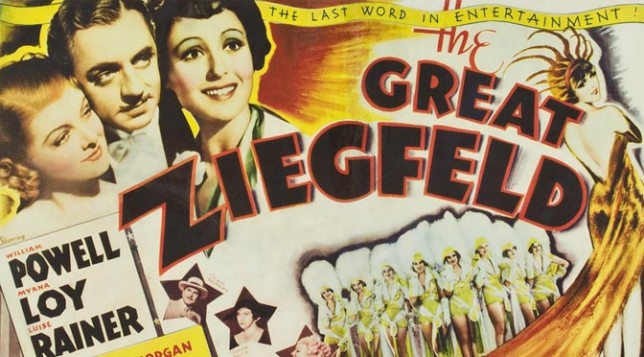1936
So close to the 40s I can almost taste them. They taste of copper and ash and white supremacy. And once again, the Oscars and the public are of like mind…
The Joint Champion
“Suggested by romances and incidents in the life of America’s greatest showman, Florenz Ziegfeld Jr,” says one of the credits, and I don’t know why I saw this title so many times and never once realized it would be about the Ziegfeld Follies guy. The Great Ziegfeld chronicles Florenz’ rise from carnival barker trying to sell tickets to a strong man named Sandow to building the Ziegfeld Follies and oh damn it is this the birth of my least favourite Oscar genre?
As Patrick Willems explains, the music biopic never should have survived Walk Hard: The Dewey Cox Story, and certainly shouldn’t still be churning out anything as bland and generic as Bohemian Rhapsody. While this genre has some successes (Willems names a couple in that video, I might include Rocketman and Judy), overall it’s an extra empty version of the Great Man Biopic, Oscar season’s least necessary by-product. So I was a little trepidatious about taking on Oscar’s first big music biopic, especially given its three hour runtime.
And I was kinda right to be.
The Great Ziegfeld covers the highs and lows of Ziegfeld’s career, the smash hits and the frequent bankruptcies. It paints Ziegfeld as a skilled hustler, always able to charm talent to his banner and find a hook to bring audiences to his shows (eventually). It also paints him as terrible with money, constantly needing to scam and scrounge his way to funding each new show because he can’t stop spending money like it’ll never run out. At one point he finally learns to save and invest… then loses everything in the stock market crash of 1929. Like, minutes later. Nowhere is this hustler/beggar dichotomy clearer than with his friend/rival Jack Billings, from whom Ziegfeld steals crowds, talent, women, and even a butler, but to whom he is always needing to turn for money. And while I don’t know if they meant to show him as frequently bullying his talent into better performances, it certainly comes across that way now. And it’s probably too mean to Ziegfeld’s first wife, played by Luise Rainer, whose Nicolas Cage B-Movie-level overacting won her an Oscar because in the early days of film, acting was sometimes judged on quantity rather than quality. Actually that never stopped, did it…
There’s a lot of the music biopic cliches that still won’t die today. Less attention is paid to Ziegfeld’s life or purpose than showing us the inspiration point for so many of his shows. We even see him inspire Will Rogers to transition from cowboy rope tricks to political commentary. And given that Whoopee! was based on a Ziegfeld play, I shouldn’t have been surprised that Eddie Cantor kept coming up. I also guess I shouldn’t be surprised that every time we see the actor playing Eddie, he’s in blackface, which frankly proves I’m right to spit upon the name Eddie Cantor.
But its real problem is that it is so very overindulgent. It’s three hours and five minutes long, and it doesn’t need to be. You could cut the overture, entr’act, exit music (honestly I don’t even think stage plays need two of those, but that’s another blog), and especially the long, long recreations of Follies numbers.
But maybe that was the appeal. Maybe, in 1936, people flocked to this movie because this is how anyone who hadn’t been able to get to New York and pay Broadway ticket prices was able to experience the full spectacle of a Ziegfeld Follies production. Similar to making a movie of The Producers with Nathan Lane and Matthew Broderick: everyone who couldn’t see it live could at least see this, well, pale shadow of what the live show with these stars had been.
And that’s all fine for 1936, but in 2020 it feels like excessive padding, a worse version of when Bohemian Rhapsody felt the need to end with a sweeping lip-sync of Queen’s entire Live Aid set.
And Rotten Tomatoes Says: They also found it too long, cliché-ridden, and overindulgent. With an adjusted score of 68.5%, Great Ziegfeld comes in at 88/93.
What Would Yancey Cravat Do: I’m actually at a loss on this one. There are only three things Yancey Cravat never truly conquered: death, entrenched white supremacy, and live theatre. Maybe he could have taught Florenz how to save his money, but I wouldn’t bet on it.
Other Events in Film
Nothing major.
Next Page: More Biopics, Hooray [pours stiffer drink]


One thought on “Art Vs Commerce: Beginnings (20s/30s)”